External links
- Stefan Auber papers, 1920-1982 Music Division, New York Public Library for the Performing Arts.
| International | |
|---|---|
| National | |
| Artists | |
The Kolisch Quartet was a string quartet musical ensemble founded in Vienna, originally (early 1920s) as the New Vienna String Quartet for the performance of Schoenberg's works, and (by 1927) settling to the form in which it was later known. It had a worldwide reputation and made several recordings. The quartet disbanded in the United States during the early 1940s.
violin 1:
violin 2:
viola:
violoncello:
In the early 1920s, the Viennese violinist Rudolf Kolisch began to study composition with Arnold Schoenberg, who also put Kolisch to work in the composer's "Society for Private Musical Performances" (Verein fuer musikalische Privatauffuehrungen). This led to the creation of a string quartet ("Neue Wiener Streichquartett") dedicated to performing Schoenberg's music, but also to performing the classical string quartet repertoire in a manner which would take into account the principles of Schoenberg's teaching. The quartet consisted initially of Kolisch and Fritz Rothschild (alternating first and second violins), Marcel Dick (viola) and Joachim Stutschewsky (cello). This ensemble began to concertize and tour in central Europe.
By 1927, the membership of the ensemble had settled: Kolisch played first violin, Felix Khuner played second violin, Eugene Lehner played viola and Benar Heifetz played cello; this group became known as the Kolisch Quartet. Numerous works were written for them by composers including Alban Berg, Anton Webern, Arnold Schoenberg, and Béla Bartók. The Quartet's tours extended eventually to include all European countries including Scandinavia, and also (by the mid-1930s) North and South America.
One notable aspect of the Quartet was that they generally performed from memory, including difficult modern works such as the Lyric Suite of Berg. This was not intended as a demonstration of any special powers of memorization, but rather of an approach which involved such careful rehearsal that by the time a piece was ready for performance, the musicians no longer required the score. The quartet used eye contact and were more able to respond musically to one another without music stands interfering.
The Quartet was on tour in Paris in 1938 when Nazi Germany annexed Austria. Because of their association with Schoenberg (whose music had been banned by the Nazis) and because most of the members of the Quartet were considered Jewish according to the Nazi legal definition, they did not return to Vienna. They set up their headquarters in Paris and toured from there.
Béla Bartók's String Quartet No. 6 is dedicated to the Kolisch Quartet, and it was they who gave its premiere at The Town Hall in New York City on 20 January 1941. [1]
They were on tour in the United States when that country entered the war and civilian transport across the ocean suddenly became unavailable. Rather than continue with the Quartet in the face of great uncertainty about the future, the cellist and violist soon took jobs with major U.S. orchestras (Philadelphia and Boston, respectively). The Quartet continued to play concerts with replacement players for some time, but when the second violinist left to join an orchestra in San Francisco, the Quartet finally disbanded.
The Kolisch Quartet recorded several albums of string quartets of Franz Schubert and Wolfgang Amadeus Mozart on 78s for the Columbia Records and RCA record labels. In 1937 they recorded the four string quartets of Arnold Schoenberg privately under the composer's supervision; these were re-issued several years later as LP recordings on the "Alco" label. All the commercial recordings of the Kolisch Quartet are currently available on compact discs.

The term string quartet can refer to either a type of musical composition or a group of four people who play them. Many composers from the mid-18th century onwards wrote string quartets. The associated musical ensemble consists of two violinists, a violist, and a cellist.

Robert Marcel Casadesus was a renowned 20th-century French pianist and composer. He was the most prominent member of a distinguished musical family, being the nephew of Henri Casadesus and Marius Casadesus, husband of Gaby Casadesus, and father of Jean Casadesus.
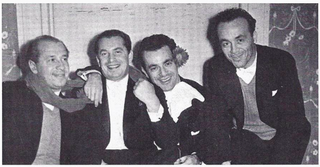
The Budapest String Quartet was a string quartet in existence from 1917 to 1967. It originally consisted of three Hungarians and a Dutchman; at the end, the quartet consisted of four Russians. A number of recordings were made for HMV/Victor through 1938; from 1940 through 1967 it recorded for Columbia Records. Additionally, several of the Quartet's live performances were recorded, at the Library of Congress and other venues.
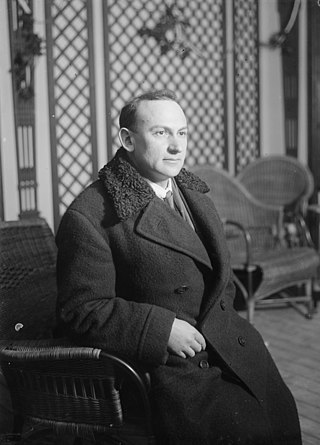
Joseph Yulyevich Achron, also seen as Akhron was a Russian-born Jewish composer and violinist, who settled in the United States. His preoccupation with Jewish elements and his desire to develop a "Jewish" harmonic and contrapuntal idiom, underscored and informed much of his work. His friend, the composer Arnold Schoenberg, described Achron in his obituary as "one of the most underrated modern composers".
Rudolf Kolisch was a Viennese violinist and leader of string quartets, including the Kolisch Quartet and the Pro Arte Quartet.

Eugene Lehner was a violist and music educator.
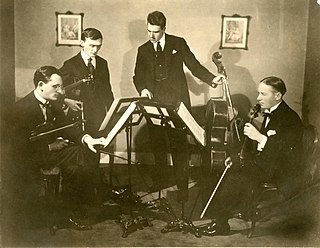
The London String Quartet was a string quartet founded in London in 1908 which remained one of the leading English chamber groups into the 1930s, and made several well-known recordings.
The Léner String Quartet, sometimes written the Lehner String Quartet, was a string quartet of Hungarian origin, founded in Budapest in 1918, which for most of its pre-war career operated in or from London. They appeared at the Royal Albert Hall, London on three occasions between 1922 and 1926. They also performed in New York, Amsterdam, and elsewhere in Europe. The Léner made the first complete recorded cycle of Beethoven quartets.
The Pro Arte String Quartet is a string quartet founded in Belgium, which became affiliated with the University of Wisconsin-Madison in 1941.
The Hungarian String Quartet was a musical ensemble of world renown, particularly famous for its performances of quartets by Beethoven and Bartók. The quartet was founded in Budapest in 1935 and was disbanded in 1972.
This is a complete list of recordings by the Los Angeles Philharmonic, shown alphabetically by conductor, and then by recording label.
The New Hungarian Quartet was a string quartet founded by Andor Toth in 1972 at Oberlin Conservatory of Music, where members were on the faculty. It is separate from the well-known Hungarian Quartet, though the violist in both groups was the same. From 1975 until 1979 the quartet was the first faculty quartet-in-residence at the Taos School of Music in Taos, New Mexico.
The Melos Ensemble is a group of musicians who started in 1950 in London to play chamber music in mixed instrumentation of string instruments, wind instruments and others. Benjamin Britten composed the chamber music for his War Requiem for the Melos Ensemble and conducted the group in the first performance in Coventry.
Felix Khuner was the second violinist of the Kolisch Quartet. He joined the quartet, then the Wien Quartet, in 1926 when the quartet needed a new second violinist. Khuner was reluctant, but when he visited Rudolf Kolisch, he was in conversation with Arnold Schoenberg. "Does the quartet rehearse with Schoenberg?" Khuner asked. When Kolisch answered yes, Khuner agreed to join the quartet. He was also once said to have echoed Kolisch's remarks about Stravinsky's compositions as "music about music". One of the notable places he performed with the Kolisch Quartet was Stephen Foster Memorial Hall in Pittsburgh, Pennsylvania.
Samuel Carlton Cooley was an American violist and composer.
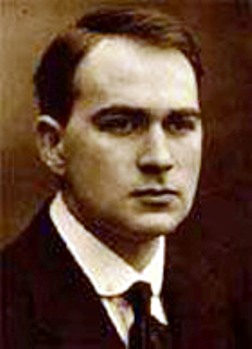
Sándor Jemnitz, also known as Alexander Jemnitz, was a Hungarian composer, conductor, music critic and author.
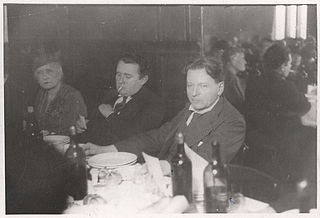
Piano Quartet No. 2 in D minor, Op. 30, is a chamber-music composition by the Romanian composer George Enescu, written in 1943–44.
The Rosamonde Quartet is a French string quartet ensemble established in 1981. It takes its name from Rosamunde, a 1823 composition of incidental music by Franz Schubert, from which he reused a theme in his 13th quartet, nicknamed Rosamunde Quartet.
Virginia Majewski was an American viola and viola d’amore player.